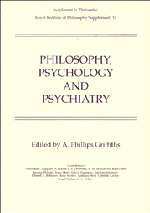Book contents
- Frontmatter
- Contents
- Preface
- Introduction: Just Getting Started
- Mind and Madness: New Directions in the Philosophy of Psychiatry
- Emotion and Memory: The Second Cognitive Revolution
- Meaning and Mechanism in Psychotherapy and General Psychiatry
- Making Sense on the Boundaries: On Moving Between Philosophy and Psychotherapy
- Mental Disorder, Illness and Biological Disfunction
- Integrity, Boundary and the Ecology of Personal Processes
- Multiple Personality and Computational Models
- Psychology and Politics: Lies, Damned Lies and Self-Deception
- Personal Identity and Psychiatric Illness
- Vices and the Self
- Wild Beasts and Idle Humours: Legal Insanity and the Finding of Fault
- Dangerousness and Mental Disorder
- Problems with the Doctrine of Consent
- Homosexuality
- Nietzsche and Music
- References
- Notes on Contributors
Mind and Madness: New Directions in the Philosophy of Psychiatry
Published online by Cambridge University Press: 03 May 2011
- Frontmatter
- Contents
- Preface
- Introduction: Just Getting Started
- Mind and Madness: New Directions in the Philosophy of Psychiatry
- Emotion and Memory: The Second Cognitive Revolution
- Meaning and Mechanism in Psychotherapy and General Psychiatry
- Making Sense on the Boundaries: On Moving Between Philosophy and Psychotherapy
- Mental Disorder, Illness and Biological Disfunction
- Integrity, Boundary and the Ecology of Personal Processes
- Multiple Personality and Computational Models
- Psychology and Politics: Lies, Damned Lies and Self-Deception
- Personal Identity and Psychiatric Illness
- Vices and the Self
- Wild Beasts and Idle Humours: Legal Insanity and the Finding of Fault
- Dangerousness and Mental Disorder
- Problems with the Doctrine of Consent
- Homosexuality
- Nietzsche and Music
- References
- Notes on Contributors
Summary
These are exciting times for philosophy and psychiatry. After drifting apart for most of this century, the two disciplines, if not yet fully reconciled, are suddenly at least on speaking terms. With hindsight we may wonder why they should have ignored each other for so long. As Anthony Quinton pointed out in a lecture to the Royal Institute of Philosophy a few years ago, it is remarkable that philosophers, in a sense the experts on rationality, should have had so little to say about the phenomena of irrationality (Quinton, 1985, ch. 2). There have been partial exceptions, of course. Descartes and Kant both touched on madness; and there were, notably, important philosophical influences on the development of modern psychiatry in the late nineteenth and early twentieth centuries (Zilboorg and Henry, 1941). Yet even John Locke, who was a doctor as well as philosopher, confined himself to a fairly superficial distinction between what we should now call mental illness and mental defect—those with, in Locke's view, respectively too many ideas and too few (Locke, 1960).
The question that now arises is where do we go from here? Is this a brief conjunction of the two disciplines, a fin de siècle phenomenon, like that experienced at the end of the last century? Or is it the beginning of a more enduring relationship?
Things could go either way, I believe. On the one hand, there are a number of factors, both practical and theoretical, which could work against the relationship.
- Type
- Chapter
- Information
- Philosophy, Psychology and Psychiatry , pp. 5 - 24Publisher: Cambridge University PressPrint publication year: 1995

